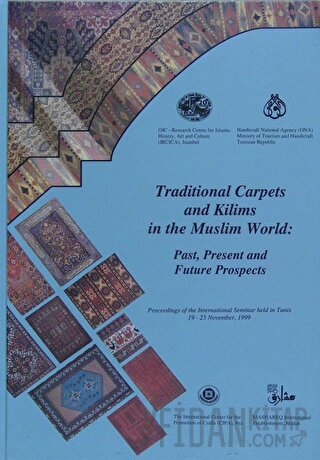
This book illustrates the present state of “Traditional Carpets and Kilims” in various parts of the Muslim world together with a historical background of the sector representing its cultural and heritage aspects. Through this volume, the reader will enjoy the opportunity of knowing closely the sector of traditional carpets and kilims in countries where publications on such topics often appeared only in local languages. This work is considered as a documentary, photographing the characteristics and beauty of carpets and kilims not only in the Muslim countries such as Algeria, Azerbaijan, Burkina Faso, Egypt, Jordan, Lebanon, Iran, Kuwait, Malaysia, Morocco, Pakistan, Palestine, Qatar, Kazakhstan, Syria, Tunisia, Turkey, Uganda, Uzbekistan, Yemen Republic, but also in some other countries such as Venezuela, India, South Africa, as well as the Indian Navajo carpets in the U.S.A.
The book deals with such particular technical aspects of the subject as the use of natural dyes and the new methods used in analysing them chemically to determine the age of the carpets. The book also provides a clarification of the symbols, forms, and designs used in traditional carpets and kilims. It illustrates with diagrams these designs, the types of looms and their various parts and the spinning process. It examines the raw materials, their treatment, and the traditional tools used in carpet weaving, as well as the lines used in textile weaving. The reader will also find the reports on field surveys and statistical studies relating to the carpet and kilim markets; the problems and challenges encountered, import and export of traditional carpets and kilims and their country-wise distribution, trends observed in buyers’ preferences, demand and supply, price trends, and many other aspects and issues.
This book illustrates the present state of “Traditional Carpets and Kilims” in various parts of the Muslim world together with a historical background of the sector representing its cultural and heritage aspects. Through this volume, the reader will enjoy the opportunity of knowing closely the sector of traditional carpets and kilims in countries where publications on such topics often appeared only in local languages. This work is considered as a documentary, photographing the characteristics and beauty of carpets and kilims not only in the Muslim countries such as Algeria, Azerbaijan, Burkina Faso, Egypt, Jordan, Lebanon, Iran, Kuwait, Malaysia, Morocco, Pakistan, Palestine, Qatar, Kazakhstan, Syria, Tunisia, Turkey, Uganda, Uzbekistan, Yemen Republic, but also in some other countries such as Venezuela, India, South Africa, as well as the Indian Navajo carpets in the U.S.A.
The book deals with such particular technical aspects of the subject as the use of natural dyes and the new methods used in analysing them chemically to determine the age of the carpets. The book also provides a clarification of the symbols, forms, and designs used in traditional carpets and kilims. It illustrates with diagrams these designs, the types of looms and their various parts and the spinning process. It examines the raw materials, their treatment, and the traditional tools used in carpet weaving, as well as the lines used in textile weaving. The reader will also find the reports on field surveys and statistical studies relating to the carpet and kilim markets; the problems and challenges encountered, import and export of traditional carpets and kilims and their country-wise distribution, trends observed in buyers’ preferences, demand and supply, price trends, and many other aspects and issues.














